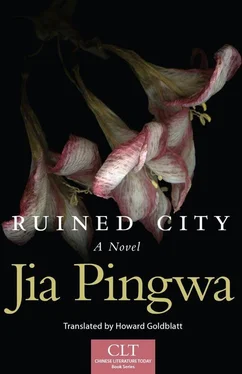They hailed a taxi and arrived at a traditional housing compound. Zhuang did not want to go in, saying it would be better if he didn’t meet Liu Yezi. Zhao told him to wait in a nearby bar while he went in to see Liu. He was pleased that she and her husband were both home. “Gong Xiaoyi is having a fix upstairs. He came with the scroll today but was afraid we wouldn’t give him anything, so he demanded that first. He said he’d hand it over after we sold him some opium. Let him have his smoke. We’ll take tea in the other room.” For reassurance, Zhao tiptoed upstairs and looked in through a crack in the door. Gong Xiaoyi was lying on the bed, out like a light, with the scroll beside his emaciated body. Zhao smiled and went down to have tea.
. . .
Gong Xiaoyi had been suffering from withdrawal symptoms for days. He went to see Liu Yezi several times a day, but she refused to sell him anything without the scroll. He went home and tried to cope, but soon returned when he could not stand it any longer. She turned him away each time, and the pattern was repeated. Again and again, five trips altogether, until his body ached so much that he rammed his head against the wall, slammed his arms against the bed boards, and pulled out handfuls of his hair. Eventually he took the scroll to Liu’s house. He fell to the floor the moment he got in, kowtowing to her and foaming at the mouth. She unrolled the scroll. It was indeed Mao’s calligraphy, with its elegant strokes, majestic and grand, the embodiment of a leader. No wonder Zhao Jingwu has to have it , she said to herself. She gave Xiaoyi some opium, which he took upstairs to satisfy his need first. As she had told Zhao, he would not part with the scroll until he was given more opium.
Once upstairs, he had begun smoking and lay down on the bed, feeling remorseful about his unseemly behavior in recent days. He had been a treasure to his father, smart, incisive, and good-looking. When the two of them had gone out together, people had praised both the father’s calligraphy and his son. Legions of families had wanted to marry their daughters to him, and countless pretty girls had smiled flirtatiously when they saw him. But none of them had been good enough for him at the time. Now he had no job, was ignored by his father, and was despised by friends and relatives. Even flat-nosed Liu Yezi showed him no pity. On his earlier visit, Liu and her husband were having sex and did not stop when they saw him. He was on the floor, sniveling and begging, while she pulled up her pants, talking to him as she took a kerchief out from between her legs. In her eyes he was subhuman. He fumed over how the world treated him when he was out of opium, which was why he resorted to seeking happiness in his opium-induced state, a way for him to exact revenge on the world. The thought inevitably created a beautiful scene before his eyes; he was his former self again, young, handsome, spirited. An ingenious idea came to him: stop the movements of the hour and minute hands on the wall clock, stop time, and let him grow a pair of wings to fly around the city and see what families were doing. Sure enough, the hands stopped moving; even a buzzing fly was halted in mid-flight. He sprouted wings and flew over houses by the west gate until he reached the east gate, then headed to the north gate and finished at the south gate. He saw everything: naked men and women were copulating in just about every house in the city, displaying a myriad of positions and body movements. He walked in and collected the filthy semen from the beds, filling three large tubs. When the tubs were full, he put them on one of the trucks that sprayed the streets with water, then drove up and down the streets. A pungent, putrid smell filled his nostrils.
“I’ve exterminated all your children!” he shouted.
Then he gathered up all the men and cut off their genitals, which he tossed into the city moat, quickly filling it up. So he razed the city wall to bury more of the human debris. He wanted to rape all the women in front of the men, to make the women scream and the men suffer. That would make him feel better. Finally, putting on a gigantic pair of straw sandals, he ran across eight hundred li of the Qin River, over the hilltop imperial tombs that were the pride of Xijing’s residents. He saw the Qian Mausoleum, which his father said had been built by Empress Wu Zetian to look like a woman lying on her back on the open plain. It was no longer a tomb, but a full-figured, beautiful, noble Wu Zetian lying there in the flesh. He raped her. Yes, he did. A wind blew, sending colorful clouds roiling in the sky. He turned to see that every one of the hilltop imperial tombs had sunk, and realized that the tombs had risen so high before because the emperors’ genitals continued to grow after their deaths. Now that he owned the world and had conquered Wu Zetian, their genitals wilted and died off, out of despair. Xiaoyi was euphoric: he was the mayor of a city where the residents were either men who could no longer copulate or women whose bodies he frolicked on, where all the money and all the treasures belonged to him, where he owned all of the opium…
Zhao had finished off three pots of strong tea, and Xiaoyi had still not come down. Liu cracked melon seeds and chatted with him. Her husband, who was at the gate, shouted: “Hey, you crazy old man. Do you buy wastepaper? We have a pile of used toilet paper. You can have it for free.”
Zhao heard a hoarse chant:
Clipped to the belt is a BP, held in the hand is a walkie-talkie, in the diner a roasted chicken to enjoy, and at a hotel a streetwalker to bed with me .
“Great! That was wonderful.” Liu’s husband laughed heartily.
“Would you stop sparring with that old junkman, Fatso,” Liu grumbled.
Ignoring her, he called out, “Do you collect used women? If you do, I guarantee you that every man on this block would give you his and get a new one.”
Liu Yezi ran out and dragged her husband inside by the ear. “You want to get a new spouse? If something like that could be done, I’d be the first to get a replacement for a scabby pig like you.”
Instead of trying to mediate, Zhao sat there enjoying the junkman’s distant shouts: “Junkman! Collecting junk and scraps!”
The scuffle between husband and wife went on for a while. “Is he is still up there?” she asked Zhao.
“Why don’t you go take a look?”
Liu went out into the yard and shouted up, “Gong Xiaoyi, haven’t you enjoyed yourself enough? Gong Xiaoyi!”
Startled out of his hallucinations, Gong came downstairs. Still immersed in his heroic fantasy, he grumbled, “What are you hollering for? Need some sex?”
“Bullshit!” Liu woke him up with a savage slap. His legs were too weak to hold him up. He fell to the steps. She reached out to snatch the scroll away.
“Good sister, we have an agreement. You can’t have that unless you sell me twelve packets.”
Liu laughed and handed him twelve small packets, receiving a roll of money in return.
“Zhuang Zhidie is a good friend of my father’s, but I wouldn’t trade the scroll to him. Now I’m pretty much giving it away.”
“Go on home. Go.” She shoved him out and shut the gate.
. . .
With Mao’s “Everlasting Sorrow” calligraphy in hand, Zhuang went to friends in the media and artistic and literary circles, inviting them to a press conference for a gallery he owned jointly with a friend. He was received with little enthusiasm; another art gallery was a hard sell, even though his name made it somewhat more interesting. There was simply too much news about galleries and bookstores. Mention of a piece of authentic calligraphy by Mao Zedong changed their minds. That was newsworthy. They were awestruck when they saw it, and some readied stories for immediate publication once the press conference was announced. Private press conferences were expensive, so Niu Yueqing got Zhao and Hong together to talk about financing the event. Hong brought out his books and managed to come up with three thousand. He complained about the difficulty of running a bookstore. Niu Yueqing said that was precisely why they were opening an art gallery. The bookstore would be part of the gallery, which would be the main source of revenue. She asked Hong to help Zhao as much as possible; he was unhappy to learn that that he would no longer be in charge, but could find no reason to object. “Sure thing. Jingwu is more resourceful than I am, so I’ll do whatever I’m asked to do. Since I can’t sit still, I’ll run errands. I’m no rear-echelon commander, but I can be a good front-line soldier.”
Читать дальше


![Matthew Vincent - [you] Ruined It for Everyone!](/books/216429/matthew-vincent-you-ruined-it-for-everyone-thumb.webp)









